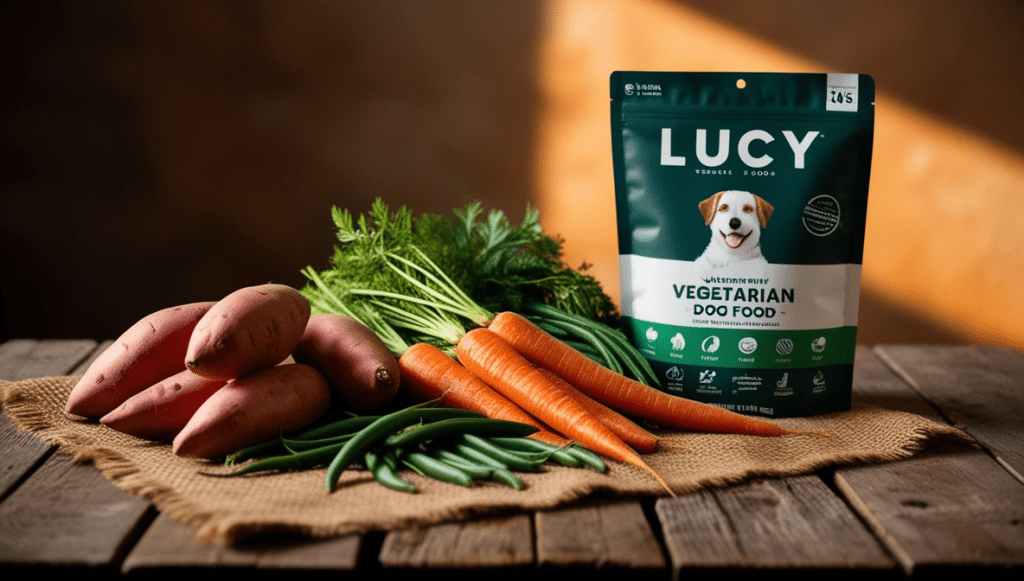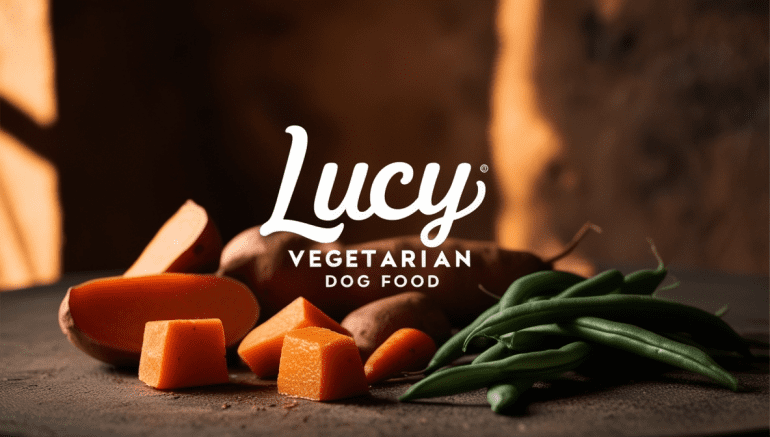Lucy Vegetarian Dog Food is designed to provide a balanced and nutritious diet for dogs while adhering to vegetarian principles. The ingredients in this dog food are carefully selected to ensure that they meet the dietary needs of dogs without including any animal products. Here’s a breakdown of the key ingredients commonly found in Lucy Vegetarian Dog Food:
Primary Ingredients
- Brown Rice: A wholesome source of carbohydrates that provides energy and supports digestive health.
- Peas: High in protein and fiber, peas contribute to muscle development and overall health.
- Potatoes: A good source of vitamins and minerals, potatoes also help provide energy.
- Carrots: Rich in beta-carotene and fiber, carrots support vision and digestive health.
- Sweet Potatoes: Packed with vitamins A and C, sweet potatoes are also a great source of dietary fiber.
- Flaxseed: This ingredient is high in omega-3 fatty acids, which promote healthy skin and coat.

Protein Sources
- Soy Protein Isolate: A plant-based protein that helps meet the protein requirements for dogs.
- Pea Protein: Another excellent source of plant-based protein that aids in muscle maintenance.
Nutritional Additives
- Vitamins: Essential vitamins like A, D, E, and B-complex vitamins are added to ensure overall health and well-being.
- Minerals: Important minerals such as calcium, phosphorus, and potassium are included to support bone health and metabolic functions.
Flavor Enhancers
- Natural Flavors: These are often derived from plant sources to enhance palatability without using animal products.
- Yeast Extract: Provides a savory flavor that dogs find appealing while also being a source of B vitamins.
Benefits of Lucy Vegetarian Dog Food
- Balanced Nutrition: The combination of grains, vegetables, and proteins ensures that dogs receive all essential nutrients.
- Digestive Health: Ingredients like brown rice and sweet potatoes are gentle on the stomach and promote healthy digestion.
- Healthy Skin and Coat: Omega fatty acids from flaxseed contribute to a shiny coat and healthy skin.
- Sustainability: By choosing vegetarian ingredients, this dog food aligns with environmentally friendly practices.
While Lucy Vegetarian Dog Food can be a suitable option for many dogs, it’s important for pet owners to consult with a veterinarian before making any significant changes to their dog’s diet. Some dogs may require specific nutrients that are more easily obtained from animal sources, so monitoring their health and nutritional intake is crucial when transitioning to a vegetarian diet.
Benefits of Feeding Your Dog a Vegetarian Diet
Feeding your dog a vegetarian diet can offer several advantages, including:
- Reduced Allergies: Many dogs are allergic to common animal proteins like chicken and beef. A vegetarian diet can help alleviate allergy symptoms such as itchy skin and digestive issues.
- Improved Digestive Health: Vegetarian diets tend to be high in fiber, which aids digestion and can help prevent issues like constipation and gas.
- Anti-inflammatory Properties: Plant-based diets are often anti-inflammatory, which can be beneficial for older dogs suffering from joint pain or arthritis.
- Weight Management: Vegetarian dog foods are generally lower in calories and fat, helping to maintain a healthy weight, especially for less active dogs.
- Sustainability: A vegetarian diet is more environmentally friendly compared to meat-based diets, aligning with the growing trend towards sustainable pet ownership.
Specific Vegetables Good for Dogs
Certain vegetables are particularly beneficial for dogs:
- Carrots: High in beta-carotene and fiber, they promote good vision and dental health.
- Green Beans: Low in calories and high in fiber, they can help maintain a healthy weight.
- Sweet Potatoes: Rich in vitamins A and C, they support immune health.
- Peas: A good source of protein and vitamins, peas can help with muscle maintenance.
- Pumpkin: Great for digestion, pumpkin is high in fiber and can help regulate bowel movements.
Ensuring Adequate Protein Intake
To ensure your dog gets enough protein from vegetarian sources:
- Combine Protein Sources: Use a mix of legumes (like lentils and chickpeas), grains (like quinoa or brown rice), and vegetables to provide complete amino acids.
- Consider Commercial Options: Look for high-quality vegetarian dog foods that are formulated to meet nutritional standards set by organizations like the AAFCO.
- Supplement Wisely: If necessary, consider adding plant-based protein supplements or consult your veterinarian for recommendations on protein sources.
Common Ingredients to Avoid in Vegetarian Dog Food
When selecting vegetarian dog food, avoid these ingredients:
- Artificial Preservatives: Look for natural preservatives instead of synthetic ones like BHA or BHT.
- Low-Quality Fillers: Avoid foods with excessive corn or wheat as primary ingredients; they offer little nutritional value.
- Excessive Sodium: High salt content can be harmful to dogs, so check labels carefully.
- Unbalanced Nutritional Profiles: Ensure the food meets AAFCO standards for complete nutrition.
Mixing Vegetarian Dog Food with Regular Dog Food
Mixing vegetarian dog food with regular dog food can be an effective way to transition your dog to a vegetarian diet:
- Gradual Transition: Start by mixing a small amount of vegetarian food with their regular food, gradually increasing the proportion over several days.
- Monitor Health: Keep an eye on your dog’s health during the transition period. Look for any signs of digestive upset or allergies.
- Consult Your Veterinarian: Always discuss dietary changes with your vet, especially if your dog has specific health concerns or dietary needs.
In conclusion, a vegetarian diet can be beneficial for dogs when carefully planned. It’s essential to ensure that their nutritional needs are met through a balanced combination of ingredients while considering any specific health requirements they may have.
